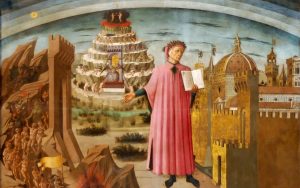Today on My Poetic Side we look at the decision by descendants of the poet Dante Alighieri to attempt to have the poet’s corruption sentence overturned by the legal system.
Attempts to Overturn Dante’s Corruption Charges
 In 1302, the poet Dante Alighieri faced accusations of crimes including extortion, fraud, perjury and embezzlement. He did not show up to court for his trial, was sentenced in his absence to be burned to death on the stake and left Florence for exile in Ravenna, where he died in 1321.
In 1302, the poet Dante Alighieri faced accusations of crimes including extortion, fraud, perjury and embezzlement. He did not show up to court for his trial, was sentenced in his absence to be burned to death on the stake and left Florence for exile in Ravenna, where he died in 1321.
Now, 700 years after his death, a descendant is asking that he is pardoned for the crimes he was said to have committed. Sperello di Serego Alighieri, who is a direct descendent of Italy’s most celebrated poet, is exploring the possibility that the trail and the death penalty subsequently handed down, which he says was politically motivated, could be overturned. There was a very public feud at the time between the rival Ghibelline and Guelph factions which played a part in the accusations.
A professor of law who is backing the family says that a pardon after 7 centuries is not an impossible request and that there is room within the law in Italy for a sentence to be altered if there is new evidence to suggest the original one was unjust.
A conference has been organised, which it is hoped will take place in May, which will involve a number of historical experts, judges and jurors who will all talk about the possibility of a pardon. There will also be some of the country’s most senior lawmakers including a procurator-general and a judge who is normally based in Rome’s Supreme Court. The aim of the conference is to decide if the sentence was made as a result of standard judicial proceedings or if it was motivated by the prevalent politics of the time.
The move has brought mixed reactions in Italy where not every citizen is convinced that Dante, who is sometimes referred to as the Supreme Poet or Il Sommo Poeta, needs to be given a pardon. They believe that whilst it is a lovely idea the memory of the poet simply does not require such a move. Dante gave Italian literature and poetry a significant amount during his lifetime and it is this that people remember him for above all else.
Whilst Dante was in exile, he wrote The Divine Comedy which told the tale of a journey undertaken by a pilgrim through Hell, Purgatory and finally Paradise. He satirised his enemies whilst lamenting the factionalism that had appeared in the politics of Florence.
Dante’s death sentence’s signatory was Cante de’ Gabrielli, who was a magistrate hailing from the town of Gubbio, Umbria. In 2016 the town asked for forgiveness for the part that they had played in the persecution and subsequent exile of the poet.


You must register to comment. Log in or Register.